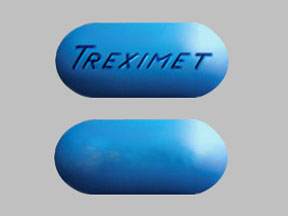
Treximet Coupons & Savings Card – Discount Prices from $120.81
Brand for: Sumatriptan-naproxen
My prescription
Edit
85-500MG, Sumatriptan-naproxen (9 Tablets)
Select pharmacy

CVS
$120.81
COUPON PRICE
Walgreens
$162.54
COUPON PRICE
Albertsons
$165.66
COUPON PRICE
Walmart
$167.51
COUPON PRICETreximet savings card
Show this card to your pharmacist
CVS
$120.81
BIN
ID
PCN
GRP
019876
LH676752B9
CHIPPO
LHX
Powered by
More prescriptions for migraine
More prescriptions for migraine
Treximet (Sumatriptan-naproxen) dosage forms
Dosage Quantity Price from Per unit 85-500MG 9 Tablets $120.81 $13.42
| Dosage | Quantity | Price from | Per unit |
|---|---|---|---|
| 85-500MG | 9 Tablets | $120.81 | $13.42 |
What is the drug TREXIMET used for?
Treximet is used for the acute treatment of migraine attacks with or without aura in adults and pediatric patients aged 12 years and older.
Is TREXIMET the same as Imitrex?
Treximet and Imitrex are not the same, although they are related. Treximet is a combination medication that contains sumatriptan and naproxen sodium, while Imitrex contains only sumatriptan. Both are used to treat migraines, but Treximet offers the additional benefit of an anti-inflammatory component due to the presence of naproxen.
How much does TREXIMET cost?
The cost of TREXIMET can vary based on factors such as the pharmacy, location, insurance coverage, and any available discounts or coupons. It is recommended to check with local pharmacies or use online tools to compare prices. Additionally, consulting with a healthcare provider or insurance company can provide more specific information regarding coverage and out-of-pocket costs.
What is the generic for TREXIMET?
The generic for Treximet is sumatriptan and naproxen sodium.
What is Treximet used for?
Treximet is used for the acute treatment of migraine attacks with or without aura in adults and pediatric patients aged 12 years and older. It combines sumatriptan and naproxen sodium to help relieve headache, pain, and other migraine symptoms.
